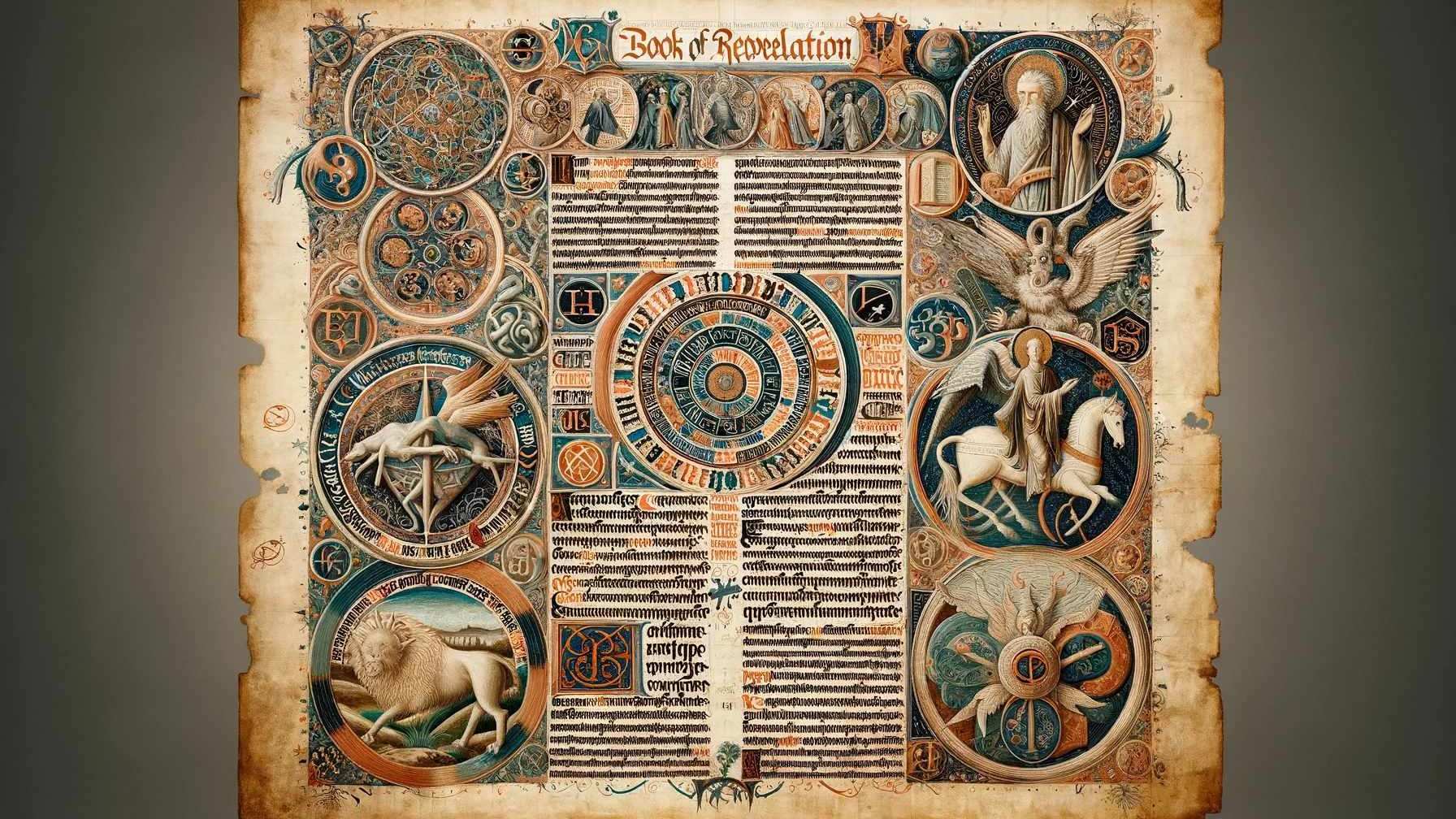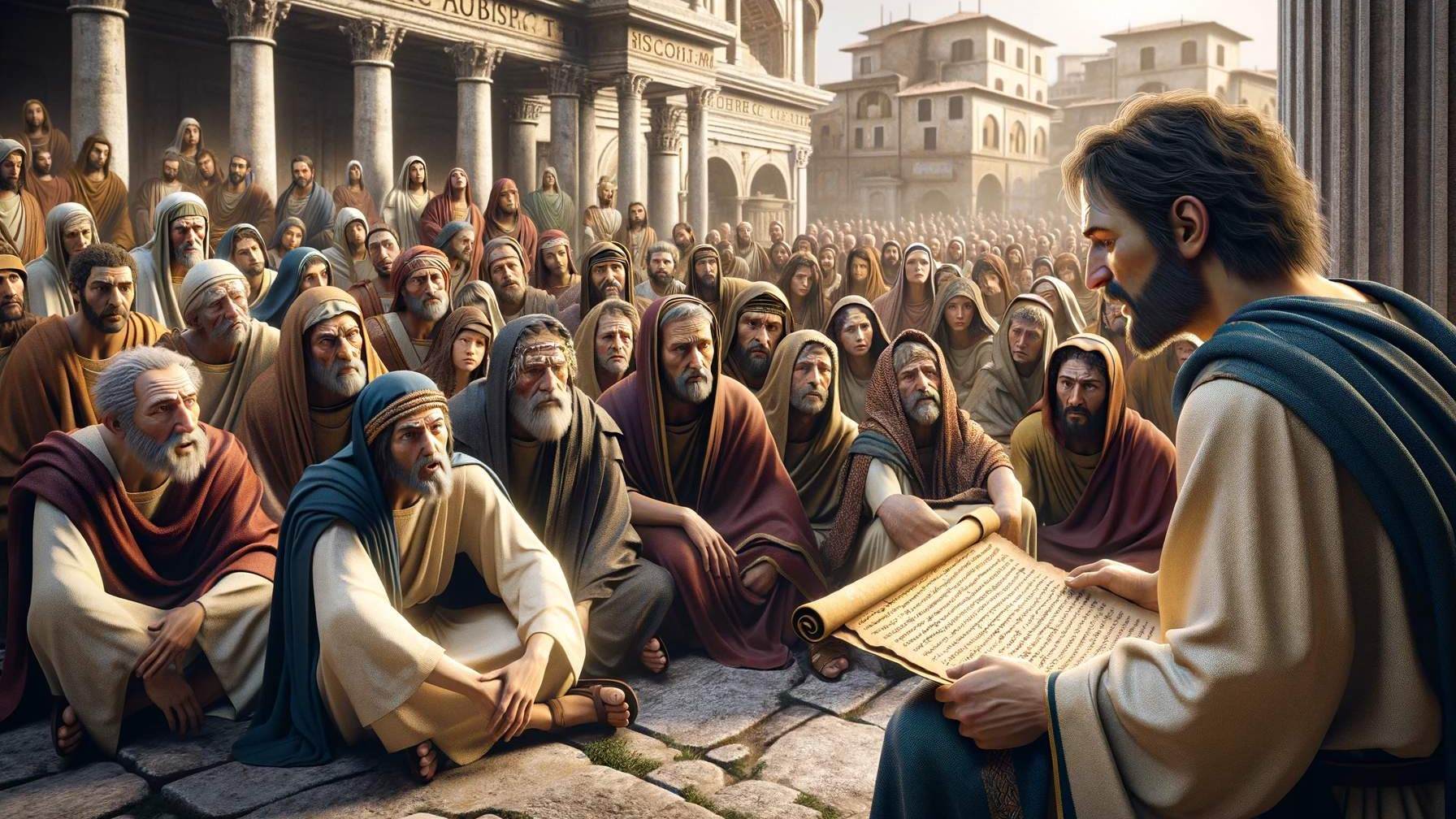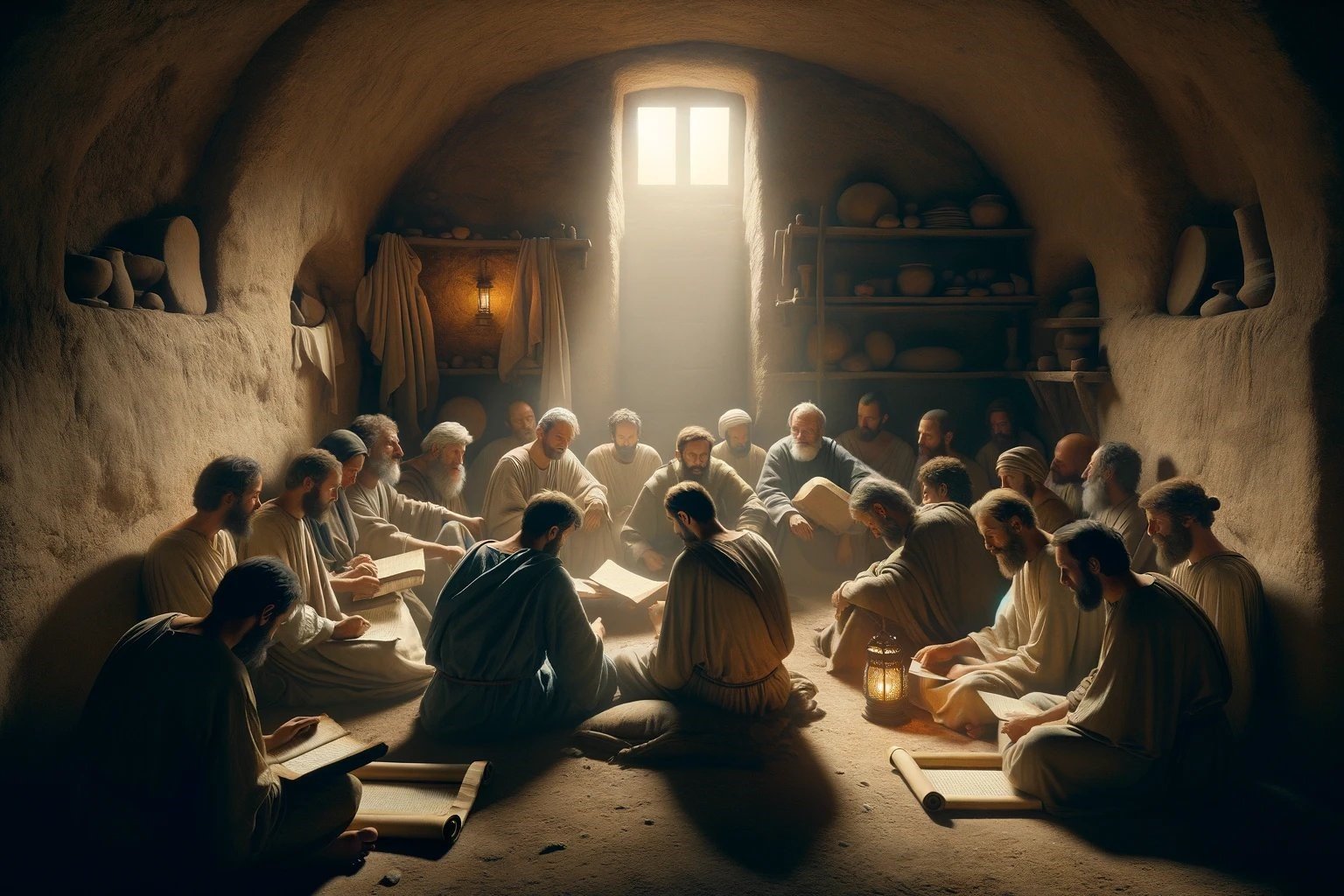Home>Bible Facts>What Does The Book Of Revelation Mean?


Bible Facts
What Does The Book Of Revelation Mean?
Published: February 11, 2024
Peter Smith, Editorial Director at Christian.net, combines deep insights into faith, politics, and culture to lead content creation that resonates widely. Awarded for his contributions to religious discourse, he previously headed a major organization for religious communicators, enhancing dialogue on faith's societal impacts.
Discover the meaning of the Book of Revelation and explore fascinating Bible facts. Gain insights into the significance of this biblical text.
(Many of the links in this article redirect to a specific reviewed product. Your purchase of these products through affiliate links helps to generate commission for Christian.net, at no extra cost. Learn more)
Table of Contents
Introduction
The Book of Revelation, also known as the Apocalypse, is the final book of the New Testament. It is a profound and enigmatic piece of literature that has captivated readers for centuries. The book is attributed to the apostle John and is believed to have been written during a time of intense persecution of early Christians. Its mysterious and symbolic nature has sparked countless interpretations and debates, making it a subject of fascination for theologians, scholars, and believers alike.
Revelation is a unique work within the Bible, as it is not a gospel or a letter, but rather an apocalyptic prophecy. It is filled with vivid imagery, symbolic language, and prophetic visions that depict the cosmic battle between good and evil, the ultimate triumph of God, and the promise of a new heaven and earth. The book is structured as a series of visions and letters addressed to seven churches in Asia Minor, conveying messages of encouragement, warning, and hope.
The overarching theme of Revelation revolves around the unveiling of divine mysteries and the ultimate victory of God's kingdom over the forces of darkness. It offers a glimpse into the spiritual realm, portraying the cosmic conflict between God and the powers of evil, the final judgment, and the establishment of a new order of righteousness and peace.
As we delve into the depths of Revelation, it is essential to approach this text with reverence and humility, recognizing its symbolic nature and the layers of meaning it contains. The book invites readers to contemplate the profound truths it conveys and to seek a deeper understanding of God's sovereignty and the unfolding of His redemptive plan for humanity.
In the following sections, we will explore the historical context of Revelation, unravel the symbolism and imagery employed in its narrative, examine the diverse interpretations it has elicited, and ultimately discern the profound message and purpose embedded within this extraordinary book. Join us on this enlightening journey through the enigmatic and awe-inspiring world of Revelation.
The Historical Context of Revelation
The Book of Revelation was written by the apostle John while he was exiled on the island of Patmos, a small rocky island in the Aegean Sea. This occurred during the reign of the Roman Emperor Domitian, who was known for his brutal persecution of Christians. The historical backdrop of intense persecution and suffering endured by the early Christian communities provides a crucial lens through which to understand the profound symbolism and urgent messages conveyed in Revelation.
During this period, Christians faced severe oppression and were subjected to harsh measures aimed at suppressing their faith. The Roman authorities demanded absolute allegiance to the emperor, often requiring individuals to offer sacrifices to the Roman gods as a demonstration of loyalty. Refusal to comply with these demands often resulted in persecution, imprisonment, and even death. In this hostile environment, the early Christians grappled with the tension between their devotion to Christ and the pressures of conforming to the demands of the Roman Empire.
The seven churches addressed in Revelation were situated in Asia Minor, a region where the Christian communities were particularly vulnerable to persecution. The messages directed to these churches reflect the challenges and trials they were facing, as well as the need for perseverance and unwavering faith in the midst of adversity. The symbolic language and apocalyptic imagery used in Revelation served as a source of encouragement and hope for the persecuted believers, assuring them of God's ultimate victory and the fulfillment of His redemptive purposes.
The historical context of Revelation underscores the significance of its message for the early Christians and resonates with relevance for believers throughout the ages. The book's portrayal of the cosmic conflict between good and evil, the triumph of God's kingdom, and the assurance of ultimate justice and restoration provided a source of strength and resilience for those enduring persecution. Understanding the historical setting in which Revelation emerged enriches our appreciation of its enduring relevance and the timeless truths it conveys.
As we delve deeper into the historical context of Revelation, we gain insight into the profound challenges faced by the early Christian communities and the enduring relevance of the book's message in the face of adversity and persecution. The historical backdrop serves as a poignant reminder of the enduring faith and resilience of those who stood firm in the face of opposition, finding hope and solace in the promises of God's ultimate victory and the establishment of His eternal kingdom.
The Symbolism and Imagery in Revelation
The Book of Revelation is renowned for its rich tapestry of symbolism and imagery, which imbue its narrative with profound depth and complexity. Through vivid and enigmatic symbolism, the book conveys spiritual truths and cosmic realities that transcend the limitations of human language. The use of symbolic language serves to evoke powerful imagery and convey profound theological concepts, inviting readers into a realm of heightened spiritual awareness and contemplation.
The imagery in Revelation is multifaceted, drawing upon a diverse range of symbols and metaphors to depict the cosmic battle between good and evil, the divine judgment, and the ultimate triumph of God's kingdom. The symbolic use of numbers, colors, animals, and celestial phenomena contributes to the intricate tapestry of Revelation's apocalyptic vision. For instance, the number seven, representing completeness and perfection, recurs throughout the book, symbolizing divine wholeness and the fullness of God's purposes. The imagery of the Lamb, a central symbol in Revelation, embodies the sacrificial atonement and triumphant reign of Christ, conveying profound theological significance.
The apocalyptic imagery in Revelation also encompasses cataclysmic events, celestial phenomena, and supernatural beings, all depicted in symbolic language that transcends literal interpretation. The vivid portrayal of cosmic upheavals, heavenly visions, and divine judgments serves to evoke a sense of awe and wonder, inviting readers to contemplate the profound mysteries of God's redemptive plan and the ultimate fulfillment of His purposes.
The symbolic imagery in Revelation is not merely ornamental but serves as a vehicle for conveying profound theological truths and spiritual realities. It invites readers to engage in contemplative reflection, transcending the literal meaning of the symbols to discern the deeper spiritual significance they embody. The imagery in Revelation beckons readers to behold the cosmic drama unfolding between the forces of light and darkness, the assurance of God's ultimate victory, and the promise of a new heaven and earth.
In essence, the symbolism and imagery in Revelation constitute a captivating tapestry that transcends the boundaries of human language, inviting readers into a realm of profound spiritual contemplation and awe-inspiring revelation. The intricate symbolism and vivid imagery serve as a conduit for conveying timeless truths and eternal realities, inviting readers to embark on a transformative journey of spiritual insight and contemplative engagement with the profound mysteries of God's redemptive plan.
The Interpretations of Revelation
The Book of Revelation has sparked a myriad of interpretations throughout history, reflecting diverse theological perspectives and hermeneutical approaches. These interpretations range from the historical, preterist, and futurist views to the symbolic and allegorical understandings of the apocalyptic text. Each interpretation offers unique insights into the profound complexities of Revelation, shedding light on its enduring relevance and theological significance.
The historical interpretation of Revelation seeks to situate the book within the context of the first-century Roman Empire, viewing its prophecies as symbolic representations of events and realities contemporary to the author and the early Christian communities. This approach emphasizes the relevance of Revelation to its original audience, highlighting its messages of hope, perseverance, and divine sovereignty amidst persecution.
The preterist interpretation regards the prophecies in Revelation as having been fulfilled in the past, particularly during the early centuries of the Christian era. This view identifies the book's imagery and symbols with historical events, such as the fall of Jerusalem or the persecutions under Roman emperors, emphasizing the relevance of its message to the immediate historical context of the early church.
Conversely, the futurist interpretation anticipates the fulfillment of Revelation's prophecies in a future eschatological scenario, emphasizing their relevance to the end times and the culmination of human history. This approach views the book as containing predictions of global cataclysms, the rise of a world-dominating figure, and the ultimate establishment of God's kingdom, offering insights into the unfolding of divine purposes in the future.
Furthermore, symbolic and allegorical interpretations of Revelation delve into the spiritual and theological dimensions of the text, emphasizing its timeless relevance and universal applicability to the human condition. These interpretations discern profound spiritual truths and moral imperatives within the symbolic language of Revelation, inviting readers to contemplate its enduring message of divine sovereignty, redemption, and the ultimate triumph of good over evil.
The diverse interpretations of Revelation reflect the multifaceted nature of the text, encompassing historical, prophetic, and theological dimensions that continue to captivate and inspire readers across generations. While the interpretations may vary, they collectively attest to the enduring significance of Revelation as a source of spiritual insight, hope, and profound revelation of God's redemptive purposes for humanity.
The Message and Purpose of Revelation
The Book of Revelation conveys a profound message and serves a compelling purpose that transcends its apocalyptic imagery and enigmatic symbolism. At its core, Revelation offers a vision of hope, assurance, and divine sovereignty amidst the tumultuous realities of human existence. The message of Revelation resounds with timeless significance, inviting readers to contemplate the ultimate triumph of God's kingdom, the assurance of justice and redemption, and the promise of a new heaven and earth.
Central to the message of Revelation is the portrayal of the cosmic battle between good and evil, the enduring faithfulness of God, and the ultimate victory of righteousness over the forces of darkness. The book unfolds a narrative of divine judgment, redemption, and restoration, offering a profound vision of the consummation of God's redemptive plan for humanity. Through its vivid imagery and prophetic visions, Revelation conveys the assurance that God is sovereign over the course of history, and His purposes will ultimately prevail, bringing about the fulfillment of His divine plan for creation.
Moreover, Revelation serves the purpose of providing comfort and encouragement to believers facing persecution, adversity, and uncertainty. The messages addressed to the seven churches in Asia Minor convey words of exhortation, warning, and hope, urging the faithful to persevere in their faith and remain steadfast in the face of trials. The book's apocalyptic imagery and symbolic language serve to inspire resilience, fortitude, and unwavering faith in the midst of adversity, assuring believers of God's ultimate vindication and the promise of eternal life.
Furthermore, the message of Revelation extends beyond its immediate historical context, offering profound insights into the enduring realities of human existence and the cosmic struggle between good and evil. It beckons readers to contemplate the profound mysteries of divine providence, the assurance of God's ultimate justice, and the promise of a new creation where righteousness reigns and every tear is wiped away.
In essence, the message and purpose of Revelation converge to offer a vision of hope, assurance, and divine sovereignty amidst the complexities of human experience. It stands as a testament to the enduring relevance of its message, inviting readers to embrace the profound truths it conveys and find solace in the assurance of God's ultimate victory and the fulfillment of His redemptive purposes for humanity.
Read more: What Is Babylon In The Book Of Revelation
Conclusion
In conclusion, the Book of Revelation stands as a remarkable testament to the enduring power of hope, faith, and divine sovereignty amidst the tumultuous currents of human history. Its enigmatic symbolism, vivid imagery, and profound messages have captivated readers across centuries, inviting them into a realm of spiritual contemplation and awe-inspiring revelation. The historical context of Revelation, rooted in the persecution and suffering of early Christian communities, underscores the enduring relevance of its message, offering solace and encouragement to believers facing adversity and uncertainty.
The symbolism and imagery in Revelation constitute a captivating tapestry that transcends the boundaries of human language, inviting readers into a realm of profound spiritual contemplation and insight. The diverse interpretations of Revelation reflect the multifaceted nature of the text, encompassing historical, prophetic, and theological dimensions that continue to captivate and inspire readers across generations. While interpretations may vary, they collectively attest to the enduring significance of Revelation as a source of spiritual insight, hope, and profound revelation of God's redemptive purposes for humanity.
The message and purpose of Revelation converge to offer a vision of hope, assurance, and divine sovereignty amidst the complexities of human experience. It stands as a testament to the enduring relevance of its message, inviting readers to embrace the profound truths it conveys and find solace in the assurance of God's ultimate victory and the fulfillment of His redemptive purposes for humanity.
As we conclude our exploration of Revelation, we are reminded of its timeless significance as a source of hope, encouragement, and spiritual insight. The book's enduring relevance transcends its historical context, offering profound truths and timeless messages that continue to resonate with readers from diverse backgrounds and beliefs. Revelation beckons us to contemplate the ultimate triumph of God's kingdom, the assurance of justice and redemption, and the promise of a new heaven and earth. It stands as a testament to the enduring power of faith, resilience, and the unwavering assurance of God's ultimate victory over the forces of darkness.
In the enigmatic world of Revelation, we find a profound invitation to contemplate the mysteries of divine providence, the assurance of God's ultimate justice, and the promise of a new creation where righteousness reigns and every tear is wiped away. It is a book that transcends the boundaries of time and space, offering a vision of hope and assurance that continues to resonate with the human spirit, beckoning us to embrace the profound truths it conveys and find solace in the assurance of God's ultimate victory and the fulfillment of His redemptive purposes for humanity.














